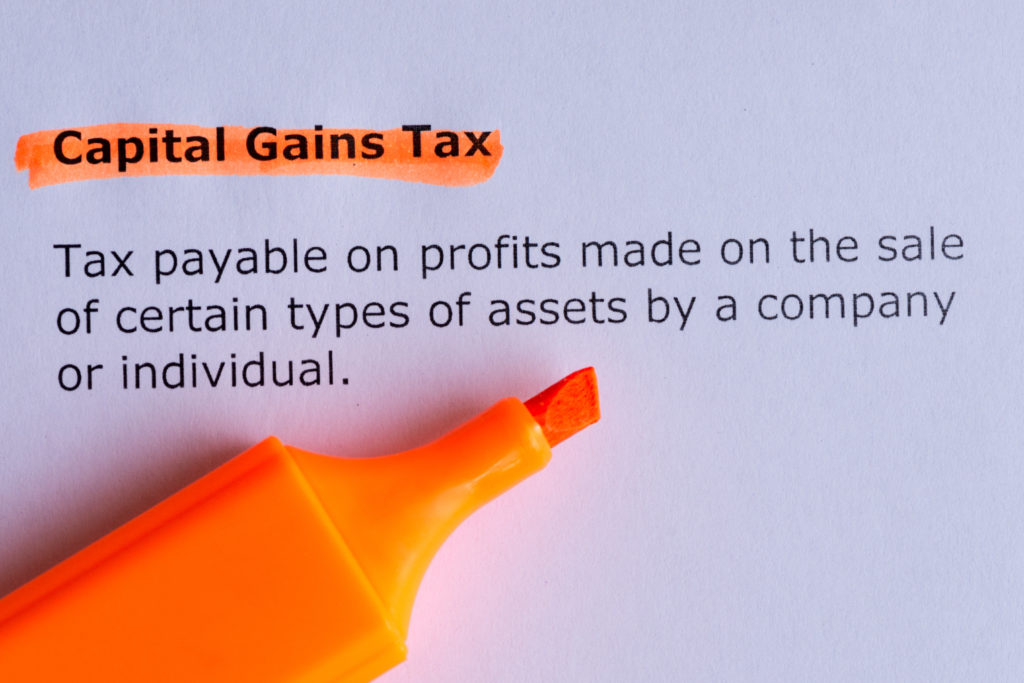Trump Holds Steady on Capital Gains Taxes…For Now

Anyone who was holding his or her breath for the president to lower capital gains taxes better exhale. At least for the moment. According to a White House spokesperson, President Trump decided against slashing capital gains taxes after meeting with his advisors last week. The president and his advisors reportedly met to discuss several policy changes regarding taxes.
The president’s decision to stand pat on capital gains taxes comes as surprise to some, as he had appeared open to the idea as recently as a month ago. However, according to reports, President Trump changed his course because he is concerned that allowing people to index their capital gains taxes to inflation might be perceived poorly.
According to White House spokesman Judd Deere, “President Trump was thoroughly briefed on the complex economic, legal and regulatory issues, and concluded that at this time he does not feel enough of the benefits will go to the middle class.”
Trump Concerned About Taxpayers’ Perception
Investors could pay lower taxes on their capital gains by tying them to the inflation rate. But Trump said he is concerned the move would be perceived as another tax break that only benefits the wealthy. Still, the move surprised some, as the president and his team have continually pushed for more tax cuts in an effort to boost the economy.
In any case, even if the president had pushed forward with the plan, it may not have gotten very far. The House, which is led by democrats, would have to approve the bill. And most members of the Democratic Party would likely oppose it.
Those in favor of the move, including anti-tax activist Grover Norquist, claim that by indexing capital gains to inflation will help increase economic growth. According to Norquist, one CEO estimated that $7 trillion in assets could be sold if the government made the change.
Critics See No Benefit
On the other hand, those who oppose such an idea say that the top 1 percent of taxpayers would benefit the most. They claim that 86 percent of the money from indexing capital gains to inflation would go to the nation’s top 1 percent. Critics also claim that the change would result in the government losing about $100 billion in tax revenue over a 10-year period. Critics also highly doubt the move would actually give the economy any boost, or help lower income Americans.
According to two leading democratic senators, Chuck Schumer of New York and Ron Wyden of Oregon, “This unilateral move would almost exclusively benefit the wealthiest Americans, add to the ballooning federal deficit, further complicate the tax code, and ignore longstanding Justice Department policy.”
President Could Still Approve the Plan
So for now the plan is off the table, but as is always the case, things could change. And there have been mixed messages regarding taxes coming from the White House lately, so stay tuned. There is always a chance that the president could change his mind.
We hope you found this article about “Trump Holds Steady on Capital Gains Taxes…For Now” helpful. If you have questions or need expert tax or family office advice that’s refreshingly objective (we never sell investments), please contact us or visit our Family office page or our website at www.GROCO.com. Unfortunately, we no longer give advice to other tax professionals gratis.
To receive our free newsletter, contact us here.
Subscribe to our YouTube Channel for more updates.
Considerately yours,
GROCO, GROCO Tax, GROCO Technology, GROCO Advisory Services, GROCO Consulting Services, GROCO Relationship Services, GROCO Consulting/Advisory Services, GROCO Family Office Wealth, and GROCO Family Office Services.

Alan L. Olsen, CPA, Wikipedia Bio

Proud sponsor of the AD Show.

Military Family Tax Relief Act of 2003
Military Family Tax Relief Act of 2003 On Nov. 11, 2003, President Bush signed into law the Military Family Tax Relief Act of 2003. Among its provisions are these tax breaks related to military personnel: Death benefits The death gratuity paid to survivors of deceased Armed Forces members rises to $12,000 and is not taxable…
Voluntary Compliance Program for Withholding Agents
Voluntary Compliance Program for Withholding Agents In a memo dated February 25, 2005, the IRS Large & Mid-size Business Division, announced that based on recently received Chief Counsel Advice, withholding agents participating in the Section 1441 Voluntary Compliance Program (VCP) would not be subject to interest charges under certain circumstances. Section 1441 requires withholding agents…
Are Casualty and Theft Losses Tax Deductible?
Are Casualty and Theft Losses Tax Deductible? If your property is destroyed, damaged, or stolen due to casualty or theft, you may be entitled to a tax deduction. A casualty is the damage, destruction, or loss of property resulting from an identifiable event that is sudden, unexpected, and unusual. A sudden event is one that…
How to Defend Yourself When Your QuickBooks Files Are Part of an Audit
How to Defend Yourself When Your QuickBooks Files Are Part of an Audit The world of technology has changed just about every aspect of our lives. The tax and accounting world is no different. Thanks to online tax programs and software packages designed for accounting purposes, keeping a solid record of your important financial information…

